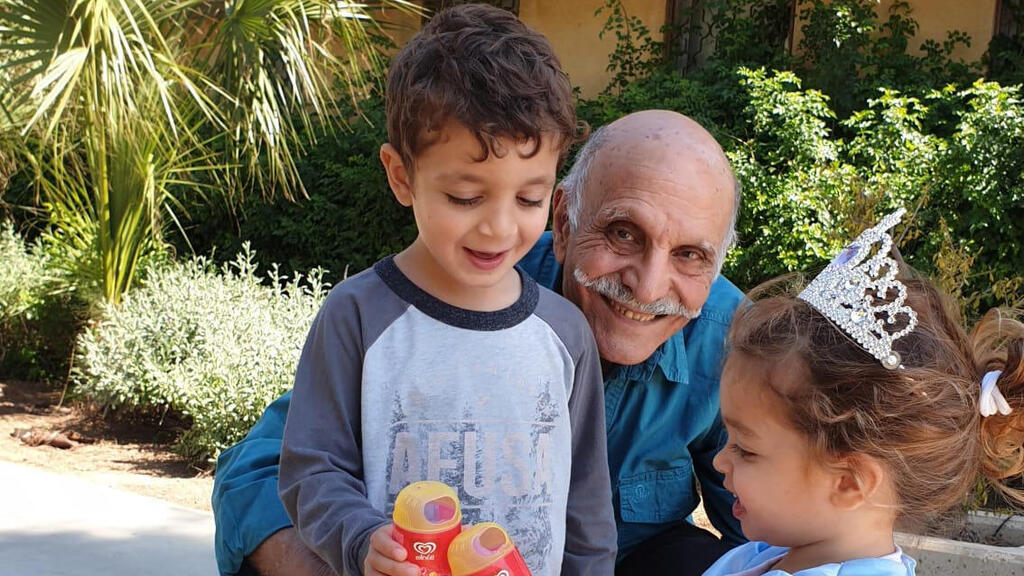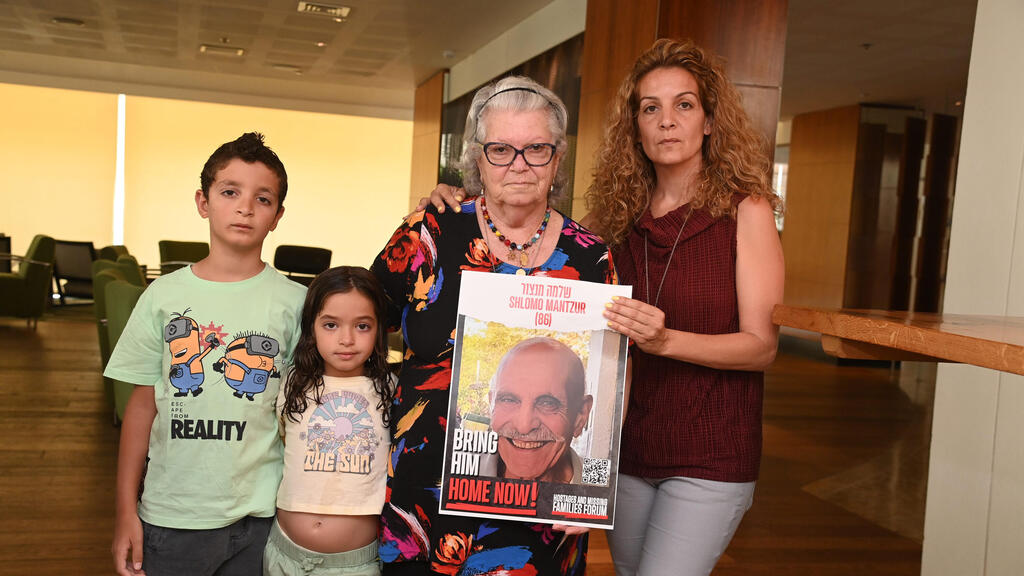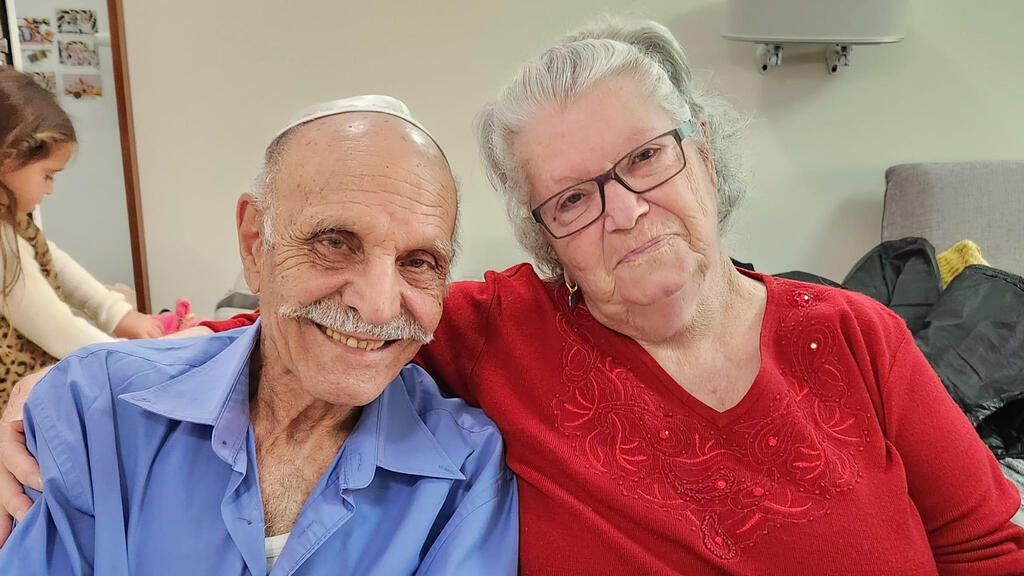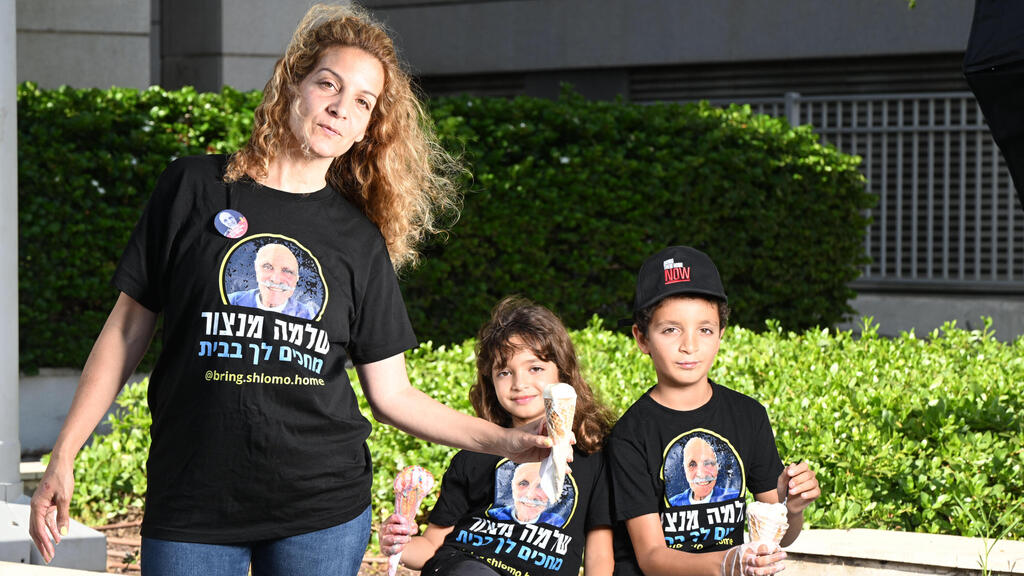Getting your Trinity Audio player ready...
In the initial months following the abduction of Shlomo Mansour, 86, his daughter Moshit chose not to tell her children, Ori, 9, and Roni, 7 that their grandfather was being held hostage by Hamas terrorists in Gaza. "I hoped that by the time I told them what happened, he would already be back with us," she says. "I never imagined we'd reach this point." But when her birthday came around, Roni was deeply hurt that her grandfather failed to celebrate with her. "How rude of him," she said.
When Ori went to school and saw pictures of the hostages on a sign calling for their return, Moshit told him that his grandfather was featured there as a representative of the border area communities. He was filled with pride and excitement. But as the kids returned to their routines, the questions began to arise. "I wrote down all their questions and promised that when Grandpa returned, they can ask him everything," she says.
"But all their questions remain unanswered to this day, and I still have no answers. Later, they learned that he was also beaten by his captors." Moshit says. "Every time, another part of the story is revealed to them adding to their fears and anxieties. We have had many nights when they shouted in their sleep. They draw, sing, and play out their fears—they live it. Grandpa is deeply missed as a person and as a symbol of the sanity that was taken from them Moshit says. "I have no way to calm them down—because I can't calm myself. "
Mansour is the oldest hostage held in Gaza, the only one from Kibbutz Kissufim. As a child in Iraq, he survived the Farhud - the pogroms against the ancient Jewish community that left hundreds dead and resulted in most of the country's Jews leaving. He immigrated to Israel from Iraq in 1951 with his family. At 16, he was among the founders of Kissufim. He is a father of five and a grandfather of 12. On March 17, he marked his 86th birthday in captivity, and earlier that month, on March 1, he was supposed to celebrate 60 years of marriage with his wife, Mazal.
"This is a man who rides a bicycle, drives a car and tends to an elaborate garden. He worked all his life in the poultry farm and the glasses factory, and learned jewelry-making and carpentry," Moshit says. "He is full of energy, always smiling and giving. He is a Renaissance man with a strong work ethic. He can fix and make anything. He fills me with pride; he has survived two persecutions, with the second occurring in his own country, in his home, where he was supposed to feel the safest."
On October 7, Moshit and her children were due to visit her parents' home, but instead, they woke to the sounds of sirens in central Israel. "We woke up in a panic and went into the safe room. During a lull, we turned on the TV and saw continuous alerts in Kissufim. I called my father to check on them. He was already waiting for us but understood the situation immediately and told me, 'They changed our plans,'" she recalls. "I managed to have two more conversations with him. The last one ended at 7:24 AM, and he promised me, 'Everything will be okay.'"
Minutes later, terrorists broke into Shlomo and Mazal's home. "My mother begged for their lives," Moshit recounts. "They violently dragged both of them out of the house, tied up my father, and beat him. My mother asked them to stop, saying, 'He is old, he did nothing.'" On the way to the terrorists' vehicle, Mazal saw an opportunity to escape. She ran to a neighbor's house and locked herself in the safe room until she was rescued under fire at 2 AM, hours later.
The terrorists set a fire to force them out, but miraculously it was extinguished. "But we don't know what happened to my father since that day. We knew something terrible had happened, but we couldn't comprehend it—our minds couldn't fathom it. We went into a sleepless night, trying to understand from my mother what happened to my father. Hours of shock and anxiety," she says.
His condition in captivity
"We know nothing about his condition," says Moshit. There has been no sign of life from him. No information about him has come from hostages who were released or rescued. "This is not a natural disappearance; there is a huge failure here. It angered me that the hostage release deal was stopped because Hamas didn't keep its end of the agreement. It's a terrorist organization," she says. "The process should not have been stopped—we should have taken everything Hamas was willing to give and only then moved on to other solutions."
Moshit says she is haunted by questions. "How did this happen, and why isn't everything being done to bring everyone back? My father has such high moral standards, which, to me, represent the country. On October 7, something in the country collapsed, and its values were lost along with my father," she says.
"Our trust in the system is broken, the worry is endless, and the longing for him is constant. Everything is a trigger—he is part of us every moment," Moshit says painfully. "The connection with my children, his grandchildren, is greatly missed now. Every time we visited Kissufim, he would greet them with excitement at the entrance to the kibbutz. He built wooden games for them, a whole children's world in the garden just for them. He never rested and gave them his full attention, and immense love for everyone, of all ages. They always knew they'd get what they wanted from him."
Mazal, Shlomo's wife, was evacuated to a hotel at the Dead Sea and is waiting to move to permanent housing in Omer near Beer Sheva. "These days, she sits and knits and worries, missing his presence and longing for the return of the man she shared 60 years of life with," Moshit says.
"I know there are miracles, and I'm waiting for one. That is my hope. Throughout my life, I have seen miracles, so I am waiting for my personal miracle."
We end the meeting with Mansour's grandchildren with ice cream, Grandpa's favorite treat. "We loved riding with him on the golf cart, going to the pool, and most of all, eating ice cream together," Ori and Roni share. "It became a family tradition, a fixed ritual where the ice cream came out of the freezer at home or when we went to pick it out at the kibbutz store," Moshit adds. "Grandpa was beaten by the terrorists, you know? I dreamt he came home, and I hugged him, but then I woke up," Ori says. "Grandpa, oh Grandpa, hug me, and we will never part," Roni sings.





